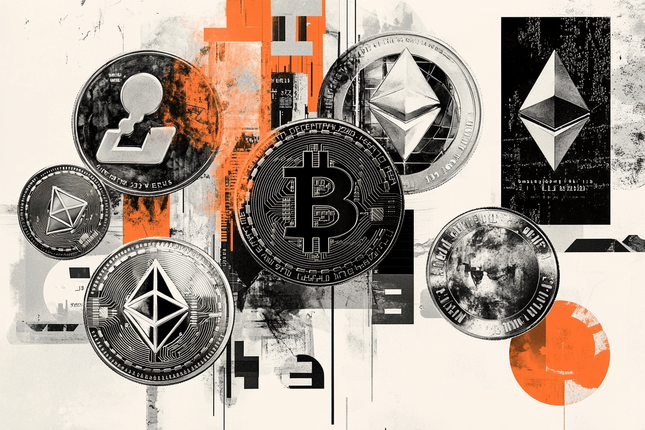Central Bank Digital Currencies (CBDCs) have emerged as a revolutionary force in the financial landscape, presenting a unique convergence of technology and monetary policy. These digital representations of national currencies are rapidly gaining traction worldwide. As the global financial system witnesses a digital transformation, CBDCs are poised to redefine the market and government dynamics, offering a plethora of opportunities and challenges. In this article, we delve into the concept of CBDCs, their potential impact on the market, and the ways in which governments are embracing this digital frontier.
Understanding CBDCs
CBDC is a digital payment instrument linked to a country's official unit of account and directly issued by the central bank. When designed for everyday transactions by households and firms, it is referred to as a "general purpose" or "retail" CBDC. Unlike other cashless payment methods such as credit transfers or e-money, a retail CBDC represents a direct claim on the central bank and not the liability of a private financial institution.
On the other hand, a "wholesale" CBDC serves a distinct purpose, targeting transactions between banks, central banks, and financial institutions. Similar to current reserves or settlement balances held at central banks, wholesale CBDCs offer potential functionalities enabled by tokenization, including composability and programmability.
One crucial distinction to bear in mind is that CBDCs are not cryptocurrencies. Unlike decentralized cryptocurrencies, CBDCs are fully regulated by a central authority or bank. CBDCs function as digital versions of fiat money, with users' personal details and transactions attached to their CBDC assets. However, the transaction specifics remain accessible only to the sender, recipient, and the bank, setting CBDC apart from crypto.
CBDCs and crypto diverge in their underlying values. CBDCs primarily serve as a means of payment and operate under the supervision of a central bank. Their blockchain networks are restricted to specific financial institutions with the necessary privileges. In contrast, cryptocurrencies function as decentralized digital assets hosted on public blockchain networks, accessible to anyone without requiring specific permissions.
Progress being made
Global work on CBDCs has made further progress in recent years. According to a BIS survey of 83 of the largest central banks in the world, 93% are engaged in some form of CBDC work and more than half are running concrete experiments or working on pilots. As work on CBDC advances, central banks’ uncertainty about short-term issuance of a CBDC is fading. The share of central banks likely to have a wholesale CBDC in the short term more than doubled. The survey suggests that there could be 15 retail and nine wholesale CBDCs circulating among the public towards the end of this decade.
As of 2023, there are 11 digital currencies already implemented in the Bahamas, Nigeria, Jamaica and countries of the East Caribbean. As you might have noticed, these 11 countries have something in common: they are small and still developing economically. This could be because small countries are the most concerned about their currency being displaced and can move faster as far as development and regulations go. This might be one of the reasons why there are twice as many retail CBDC pilot programs in the developing countries, than the developed ones: 29% vs 18%
Retail CBDCs are expected to coexist and complement existing domestic payment methods, such as Faster Payment Systems (FPS), in most jurisdictions. The coexistence of both an FPS and a retail CBDC emphasizes the need for ensuring interoperability with existing payment systems. This ensures that payers and payees can seamlessly make and receive payments, regardless of the payment method or service provider they use.
Enhancing cross-border payments is a significant driving force behind central banks' efforts in developing wholesale CBDCs. To achieve this objective, CBDC interoperability should extend beyond jurisdictional boundaries. In a report published in 2022 by the IMF, various options for accessing and ensuring interoperability of CBDCs were identified and analyzed to facilitate cross-border payments. The report underscores the importance of early-stage collaboration among central banks worldwide to fully harness the potential of both wholesale and retail CBDCs in improving cross-border payment efficiency and effectiveness.
Challenges and considerations
CBDCs often raise worries about user privacy and data security, as transactions are recorded and monitored by the central authority. With a centralized control mechanism, CBDCs may pose potential risks to individual financial data and transactional history. In contrast, cryptocurrencies are built on decentralized blockchain, offering a higher level of anonymity and privacy. However, this privacy feature has also attracted illicit activities, leading to concerns from regulators and law enforcement agencies. Striking the right balance between transparency, financial security, and individual privacy remains a challenge for both CBDCs and cryptocurrencies as they continue to evolve in the financial landscape.
As CBDCs offer a direct claim on the central bank, individuals and businesses may choose to hold their funds in CBDCs, reducing the reliance on traditional bank accounts. Central banks must carefully consider the potential disruptions that CBDC adoption could cause in the financial system. While CBDCs offer advantages like improved monetary policy transmission, they also raise concerns about the stability of commercial banks and overall financial intermediation, not to mention the missing legal framework needed for the widespread adoption. Regulators and central banks need to develop appropriate regulatory frameworks to ensure a level playing field, protect consumers, and address potential systemic risks.
Balancing the transition to CBDCs with the stability of the banking sector is crucial. Central banks may need to implement measures that encourage a smooth integration of CBDCs into the existing financial infrastructure without compromising the stability and resilience of commercial banks. Collaborative efforts between central banks, regulators, and financial institutions will be essential to navigate these potential disruptions effectively.
The information provided is for general informational purposes only. The website is owned by VAULT IST DMCC. VAULT IST DMCC, a company duly existing and organized under the laws of UAE, company registration number DMCC198149 with a registered office at Unit No: AG-13-H-F168, AG Tower, Plot No: JLT-PH1-I1A, Jumeirah Lakes Towers, Dubai, which is regulated by the laws of that country. Products and services are subject to any applicable legal restrictions, not all products and services are available in all geographic areas and are subject to applicable terms and conditions. Eligibility for particular products and services is subject to final determination by VAULT IST DMCC. Rates for products and services are subject to change. This website may contain links to third-party websites that are not under our control. We are not responsible for the content, security, or privacy practices of these external websites. Accessing these links is at your own risk. The content, design, and images on this website are protected by intellectual property laws and may not be used or reproduced without our prior written consent.
Editors’ Picks

AUD/USD stalls near 0.7150 after RBA Bullock's comments
AUD/USD has paused its uptick to near 0.7150 in the Asian session on Thursday, at a three-year high. Cautious remarks from RBA Governor Bullock seem to cap the Aussie's upside. However, renewed US Dollar weakness cushions the pair's downside ahead of US Jobless Claims data.

USD/JPY returns to the red below 153.00 after Japan's verbal intervention
USD/JPY attracts fresh sellers and falls back below 153.00 in the Asian session on Thursday. The US Dollar reverses the strong jobs data-led recovery, weighing on the pair amid the ongoing bullish momentum in the Japanese Yen, helped by Japanese verbal intervention. Japan's PM Sanae Takaichi's landslide election victory also keeps the local currency buoyed. The attention now remains on Friday's US Consumer Price Index inflation report.

Gold holds losses near $5,050 despite renewed USD selling
Gold price trades in negative territory near $5,050 in Thursday's Asian session. The precious metal faces headwinds from stronger-than-expected US employment data, even as the US Dollar sees a bout of fresh selling. All eyes now remain on the next batch of US labor statistics.

Crypto trades through a confidence reset
The cryptocurrency market is navigating a liquidity-driven reset rather than a narrative-driven rally. Bitcoin, Ethereum and major altcoins remain under pressure even as new exchange-traded fund filings continue and selected inflow days appear on the tape.

The market trades the path not the past
The payroll number did not just beat. It reset the tone. 130,000 vs. 65,000 expected, with a 35,000 whisper. 79 of 80 economists leaning the wrong way. Unemployment and underemployment are edging lower. For all the statistical fog around birth-death adjustments and seasonal quirks, the core message was unmistakable. The labour market is not cracking.
RECOMMENDED LESSONS
Making money in forex is easy if you know how the bankers trade!
I’m often mystified in my educational forex articles why so many traders struggle to make consistent money out of forex trading. The answer has more to do with what they don’t know than what they do know. After working in investment banks for 20 years many of which were as a Chief trader its second knowledge how to extract cash out of the market.
5 Forex News Events You Need To Know
In the fast moving world of currency markets where huge moves can seemingly come from nowhere, it is extremely important for new traders to learn about the various economic indicators and forex news events and releases that shape the markets. Indeed, quickly getting a handle on which data to look out for, what it means, and how to trade it can see new traders quickly become far more profitable and sets up the road to long term success.
Top 10 Chart Patterns Every Trader Should Know
Chart patterns are one of the most effective trading tools for a trader. They are pure price-action, and form on the basis of underlying buying and selling pressure. Chart patterns have a proven track-record, and traders use them to identify continuation or reversal signals, to open positions and identify price targets.
7 Ways to Avoid Forex Scams
The forex industry is recently seeing more and more scams. Here are 7 ways to avoid losing your money in such scams: Forex scams are becoming frequent. Michael Greenberg reports on luxurious expenses, including a submarine bought from the money taken from forex traders. Here’s another report of a forex fraud. So, how can we avoid falling in such forex scams?
What Are the 10 Fatal Mistakes Traders Make
Trading is exciting. Trading is hard. Trading is extremely hard. Some say that it takes more than 10,000 hours to master. Others believe that trading is the way to quick riches. They might be both wrong. What is important to know that no matter how experienced you are, mistakes will be part of the trading process.
The challenge: Timing the market and trader psychology
Successful trading often comes down to timing – entering and exiting trades at the right moments. Yet timing the market is notoriously difficult, largely because human psychology can derail even the best plans. Two powerful emotions in particular – fear and greed – tend to drive trading decisions off course.

